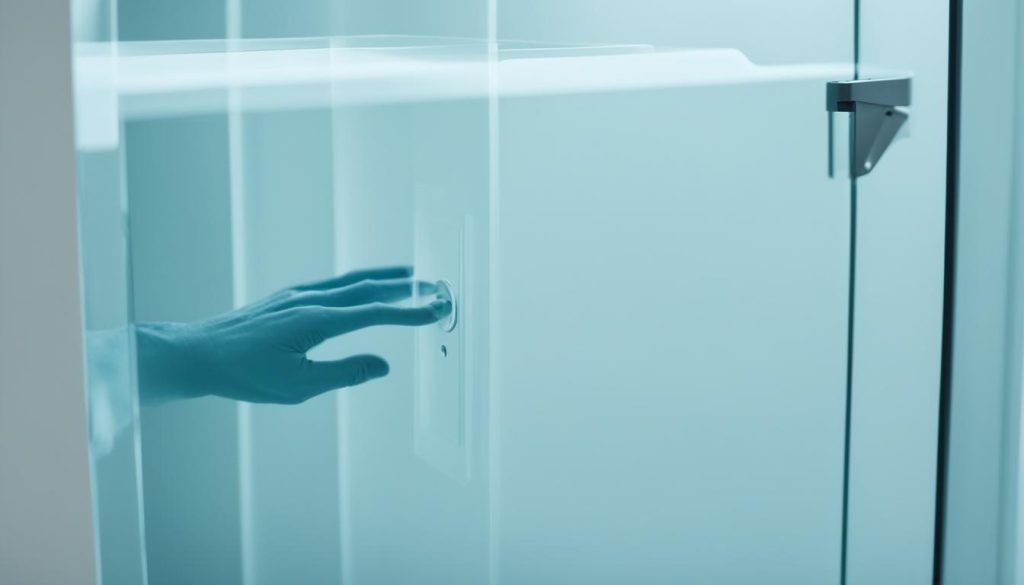Have you ever heard the sudden sound of a glass door slamming shut? It can be startling and worrying, especially if you think about the damage or injury it could cause. In Singapore, this problem is quite common in both homes and offices. But don’t worry, we have some easy solutions to stop glass doors from slamming and keep your places safe and tidy. Let’s look at how you can make your doors quieter and more controlled.
Understanding the Causes of Slamming Glass Doors
Stopping glass doors from slamming starts with knowing why they do it. Things like door imbalance and uneven hanging, or loose hinge pins and wrong installation, can cause the problem. Weather and air pressure changes also play a role.
Door Imbalance and Uneven Hanging
Doors that aren’t balanced or hung right can slam shut. If the weight is off or the door isn’t lined up, it swings open or closed too hard. This makes the door slam loudly.
Loose Hinge Pins and Improper Installation
Doors can slam if hinges are installed wrong or pins get loose. These parts can wear out, letting the door move too much. This means it can close hard without stopping. Making sure hinges are set up right and kept in good shape is important.
Weather Conditions and Air Pressure Changes
Weather like wind or changes in air pressure can affect doors. A strong gust or a big change in air pressure can make doors slam shut. Dealing with these weather changes is key to stopping the slamming.
Knowing why glass doors slam helps people fix the issue. They can make doors work better by paying attention to balance, installation, and the weather. This helps avoid the problem of slamming doors.
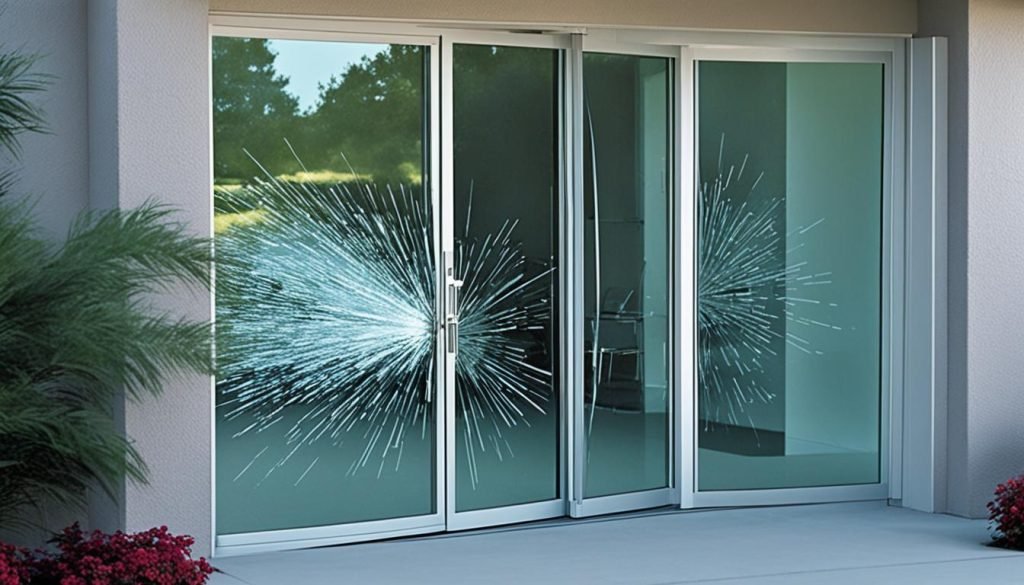
“More than 300,000 door-related injuries requiring emergency room treatment occur in the US every year.”
Checking for Warped or Irregular Glass Doors
Before fixing the door frame or installation, check the door for warping or irregularities. If the glass door is damaged or doesn’t fit right, it might slam even after other fixes. It’s important to check the door’s condition first to solve the slamming issue.
When looking at the glass door, watch for these things:
- Warped Panels: Check for bends, curves, or distortions in the glass panels. A slight warp can make the door bind in the frame, causing it to slam.
- Irregular Shapes: Make sure the door is a perfect rectangle, with no skewed or uneven sides. If it’s not even, it won’t close smoothly.
- Door Damage: Look for cracks, chips, or other damage to the glass or frame. This damage can affect the door’s structure and cause slamming problems.
If you find any of these problems, fix them before trying other solutions. Repairing or replacing a warped or damaged glass is key to a smooth, slam-free door.

“Addressing any issues with the door’s condition is a crucial first step in resolving the slamming problem.”
The Impact of Airflow and Drafts on Door Slamming
Airflow and drafts can make doors slam shut. Open windows, exhaust fans, or other air movements change air pressure. This creates a “stack effect” that pulls doors shut hard. This effect is stronger in tall buildings because of their height and temperature differences.
Increasing Insulation and Sealing Drafts
To stop door slamming, focus on better insulation and sealing drafts. Use proper weatherstripping and seal windows, doors, and openings. This stops air leaks and keeps air pressure steady. Also, maintain windows and doors to keep them tight and in good condition.
Closing Windows and Controlling Air Flow
Closing windows and managing air flow also helps prevent door slamming. Keep windows closed when the inside and outside temperatures differ a lot. This reduces the suction effect that makes doors slam. Good building design, like vestibules and vent placement, can also help control air flow and reduce stack effect problems.
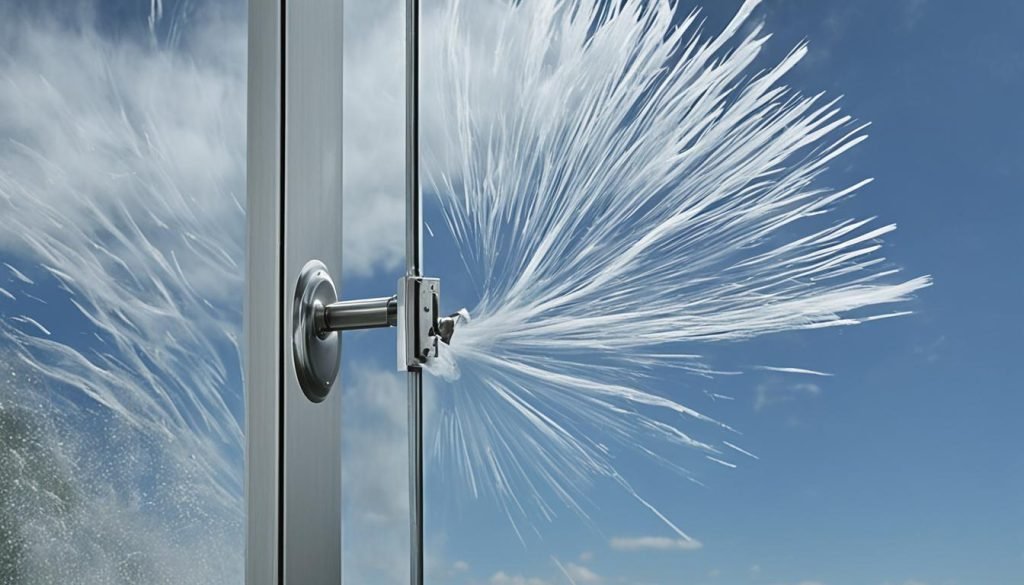
“Planning measures to control airflow in buildings during the design phase is crucial to minimizing stack effect impacts.”
By fixing the issues of airflow and drafts, building owners can lessen door slamming. This makes the indoor space more comfortable and energy-efficient for everyone.
Using Felt Pads and Foam Strips to Cushion the Slam
Stopping glass door slamming doesn’t need to be hard or costly. Using felt pads or foam strips is a simple, affordable solution. These can be put on the door or the frame to soften the impact when the door closes. They make doors quieter and protect them from damage, making them great for homeowners.
Felt pads and foam strips create a soft surface for the door to rest on as it closes. This soft surface spreads out the slamming force, making the door close quietly. It also protects the door and frame from damage, making them last longer.
Putting on felt pads or foam strips is easy and takes just a few minutes. First, measure the door’s size, then cut the pads or strips to fit. Use strong glue to stick them on the door or frame. For the best effect, put them along the whole edge or frame to catch the impact fully.
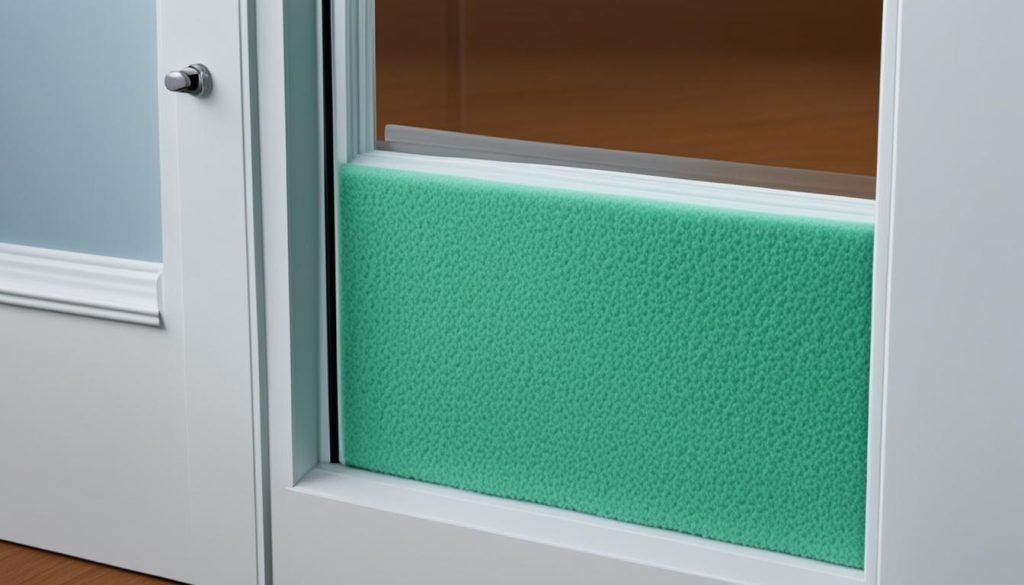
Felt pads and foam strips are also cheap and easy to find. You can buy them at most hardware stores or online at a low price. This makes them a great choice for homeowners who want to stop glass door slamming without spending a lot.
In summary, felt pads and foam strips are a simple, effective, and cheap way to stop glass door slamming. With just a few minutes of work, homeowners can make their homes quieter and safer.
Tightening and Adjusting Door Hinges
Loose or wrong hinges can make glass doors slam shut. Tightening the screws and making sure the door is balanced can fix this. But, don’t overdo it, as that can cause other issues. Small door hinge adjustments can greatly improve how the door works.
To adjust door hinges, follow these steps:
- Look for any loose screws or bolts on the hinges. Tighten them carefully with a screwdriver or wrench, avoiding overtightening.
- Check if the door is hanging straight in the frame. Adjust the hinge screws if it’s not even.
- Use a level to make sure the door is perfectly straight and level. Adjust the hinges as needed for correct alignment.
- After adjusting, open and close the door to check it moves smoothly and quietly.
By adjusting your door hinges correctly, you might fix slamming issues without needing more work. This easy fix can greatly improve your glass doors’ function and lifespan.
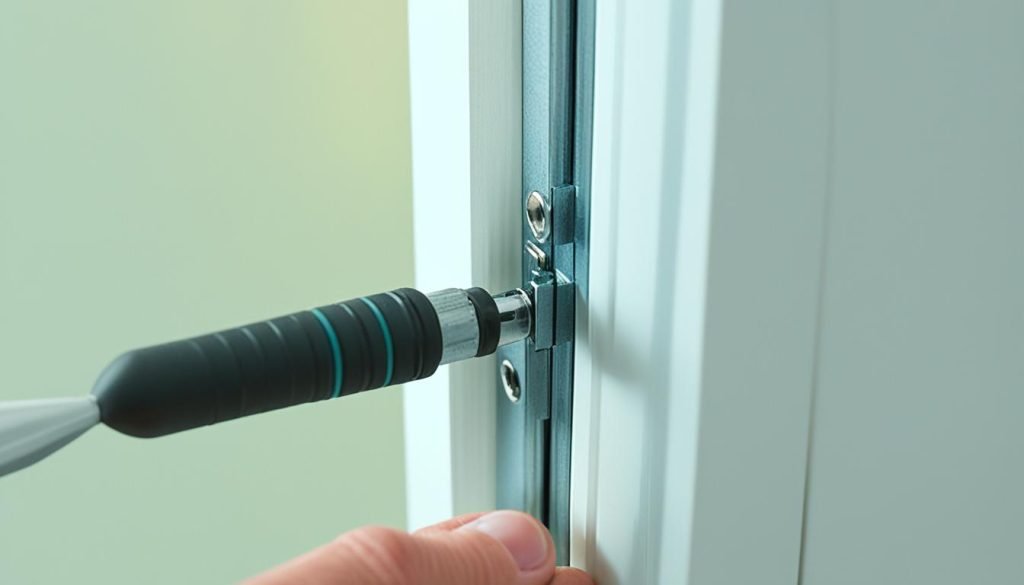
Installing Hydraulic or Pneumatic Door Closers
Installing a hydraulic or pneumatic door closer is a great way to stop glass doors from slamming. These devices use air or oil pressure to close the door slowly and gently. They don’t just rely on gravity.
Benefits of Door Closers for Safety and Security
Door closers prevent slamming and offer many safety and security benefits. They make sure the door closes right, reducing the chance of hurting someone by accident. They also make it harder for intruders to get in, improving security.
Waterson heavy duty hydraulic door closers are tough and efficient. They’re made of 316 Stainless Steel, so they don’t rust or degrade easily. They work well inside and outside and can handle strong winds and other harsh conditions.
Waterson closers are also fire-rated, meeting important safety standards. They’re perfect for commercial and institutional places. Doors for these closers should weigh at least 40 lbs for the best performance.
Installing Waterson closers is easy and they meet ADA and ICC A117.1 requirements. They come with hold-open and door stop features, making them a great choice for glass doors.
It’s important to adjust and maintain commercial door closers for them to work well. They use spring tension controlled by hydraulic fluid. Adjusting the valves helps with the latch, swing, and backcheck functions. The door should close smoothly in about 10 seconds.
Using a top-quality hydraulic or pneumatic door closer brings many benefits. You get better safety, security, and a quiet, smooth door operation. And you won’t have to worry about glass doors slamming anymore.
Weatherstripping for Better Door Sealing
Proper weatherstripping around your door frame can stop glass doors from slamming. It creates a tighter seal, reducing air pressure changes that cause sudden door closures. This helps keep your door from slamming shut.
For homes, weatherstripping is usually made of vinyl-coated foam or thermoplastic rubber. Commercial doors might use brushes or bristles. Some premium options have magnets for a tighter seal. These strips should be replaced every 5-10 years, based on how much you use them and your climate.
When putting in weatherstripping, pay attention to the details. Use magnets on the lock jamb and compression pieces on the hinge jamb. Make sure everything is aligned and adjusted right for a good seal. If your door is a bit off, special weatherstripping can help.
| Weatherstripping Material | Typical Uses | Lifespan | Key Features |
|---|---|---|---|
| Vinyl-coated foam | Residential doors | 5-7 years | Affordable, decent sealing |
| Thermoplastic rubber | Residential and commercial doors | 8-10 years | Durable, excellent sealing |
| Brushes/Bristles | Commercial doors | 6-8 years | Effective for high-traffic areas |
| Magnetic | Residential and commercial doors | 7-9 years | Premium sealing, easy installation |
Choosing the right weatherstripping and installing it correctly can greatly improve your door’s seal. It reduces air leaks and makes your space quieter and more energy-efficient. This simple change can prevent glass door slamming and keep your home or office in good shape.
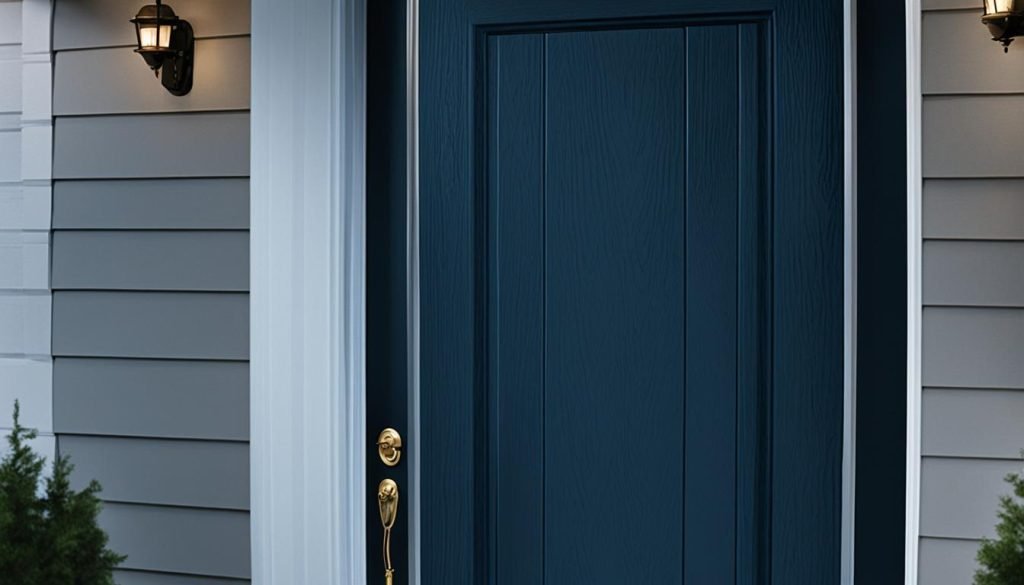
how to prevent glass door from slamming with Door Stoppers
Using door stoppers is a great way to stop glass doors from slamming. These devices can be placed on the floor or attached to the door frame. They stop the door from closing fully, so it closes softly instead of loudly.
Door stoppers are available in many materials and styles. They fit different doors and match various decor. You can find them in stainless steel, fabric, and more. They help solve door slam prevention issues in many rooms, like the living room, bedroom, and even kids’ areas.
- Stainless steel door stops can weigh up to one kilogram, making them great for heavy doors that don’t need extra holding.
- Fabric door stops work well for doors without handles and help keep out drafts.
- Door wedges come in plastic, stainless steel, or wood. They stop doors from slamming or hitting walls.
- Magnetic door stops are screwed into the floor and have a magnetic ring for the door. They’re a flexible way to stop doors.
- Door dampers are made of plastic, stainless steel, or rubber. They reduce the impact of doors on walls.
Adding door stoppers to your home or office makes it quieter, safer, and less likely to have damage. They prevent noise, door damage, and even injuries. Look through the many options to find the best door slam prevention solution for you.
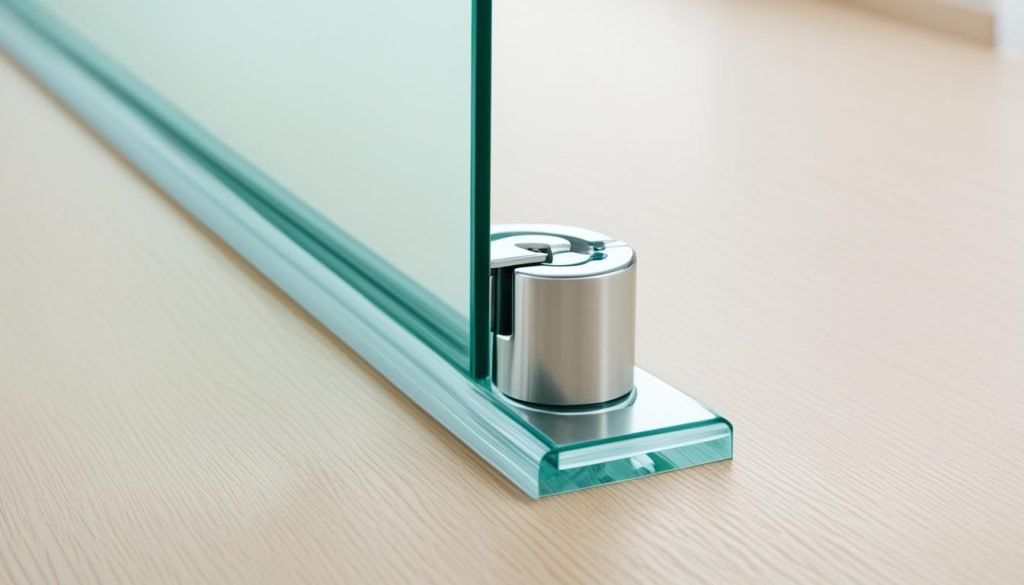
Pinch Guards: Protecting Fingers and Reducing Noise
Pinch guards are a smart solution for a safe and quiet home. They prevent doors from slamming and protect our fingers from injury. These devices fit on doors and stop the door from closing too fast, keeping fingers safe.
They also help reduce the noise from slamming doors. By slowing down the door’s closure, pinch guards make homes quieter. This is especially good for homes with kids or people who sleep lightly.
Choosing quality pinch guards is wise for those who care about door safety and finger protection. They let us use glass doors safely, keeping our loved ones safe. A simple step like this can make a big difference in a peaceful home.
“Pinch guards are a game-changer for families with young children. They provide that extra layer of protection and peace of mind that every parent seeks.”
When updating your home, consider adding pinch guards. They’re versatile and effective, making them a must-have for any modern home. These door protectors are key to a safer and more comfortable living space.
Door Filters for Noise Reduction
We all want a quiet and peaceful place at home or in the office. Door filters are a simple way to lessen the noise from slamming doors. They limit airflow through the door, reducing the loud bang.
Installing door filters is easy and they’re affordable. This makes them a great choice for anyone wanting a quieter space. By placing them right, we can lessen the noise that can interrupt our day, at home or at work.
Door filters work by controlling airflow. When the door closes, the filter slows down the air movement. This stops the sudden, loud sound, making the door close more quietly.
These filters do more than just reduce noise. They also help with keeping the temperature steady, which can save money on heating and cooling. This is good for both homes and businesses, offering many benefits with just one easy step.
Door filters are a great way to make your home or office quieter. They stop the loud sound of slamming doors. By using these devices, we can have a quieter space that’s free from disturbing noises.
| Soundproofing Statistic | Value |
|---|---|
| Largest gap for soundproofing | Doorway |
| Typical weight of a soundproof door | 300 to 500 pounds |
| Potential cost savings with soundproofing | Heating and cooling |
| Necessity of soundproof doors | Working from home, noisy neighbors |
| Effectiveness of soundproofing materials | Denser materials are more effective |
“Soundproof doors are essential for individuals working from home and needing a quiet environment.”
Using door filters in our homes and offices helps reduce the noise from slamming doors. This makes our spaces more peaceful and productive. These easy and affordable solutions improve the quality of our living and working areas.
Conclusion
Preventing glass door slamming in Singapore means using many different methods. We can fix the hinges, add cushioning, or use special devices like door closers. This helps us solve the main problems that cause doors to slam.
Checking and fixing our glass doors often helps prevent slamming in the future. Also, making sure fire doors are set up right with safety gear is crucial. With these steps, we can make our spaces safer and quieter.
If you live or work in Singapore, dealing with glass door slamming is important. It improves safety, security, and peace of mind. By keeping up with door maintenance and using the tips here, we can enjoy our glass doors without the worry of slamming.

